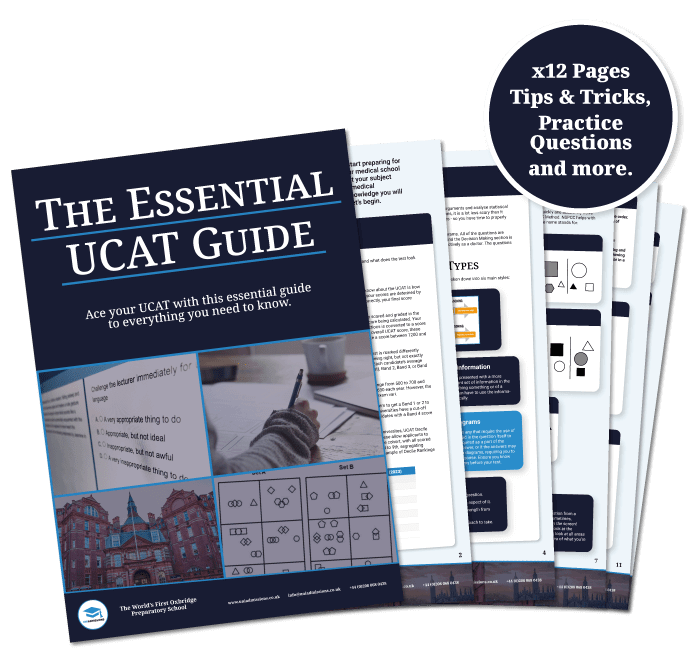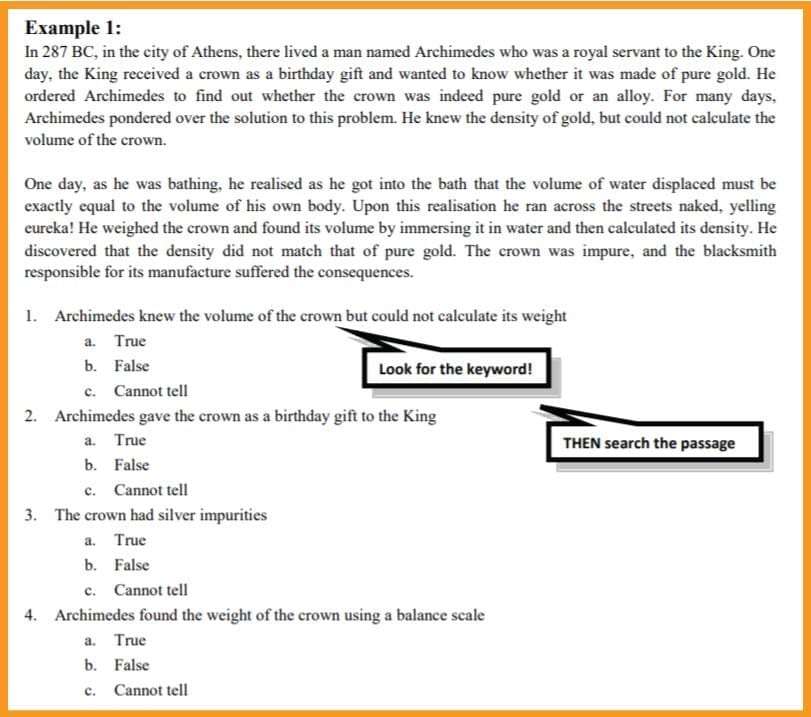UCAT CHANGES 2025
The Abstract Reasoning subtest will be removed from the UCAT in 2025. This will impact the timings and question totals of most other subtests. At UniAdmissions, we aim to provide the most recent information to all of our visitors as soon as possible.
The UCAT Verbal Reasoning section aims to assess the accuracy and speed of reading – important traits for a doctor.
Verbal Reasoning is similar to a comprehension test. You need to be able to find relevant information and then analyse statements related to the passage. You have 30 seconds to answer each question (44 questions in 22 minutes). As with all sections, you have one minute to read the instructions.
This subtest is one out of the four sections in the UCAT. The other three are:
In this UCAT Verbal Reasoning guide, we outline the questions that can come up, how to answer the true, false and cannot tell questions, with some final tips added as a bonus. Let’s get started.
UCAT Verbal Reasoning Questions
Usually, there are 11 separate passages, each with 4 questions about it. As mentioned, you have 30 seconds to answer each question in the UCAT Verbal Reasoning subtest. Build this into the time you have to also read and understand the question, that’s not much time!
You will be presented with a passage, then questions that relate to the passage. The passage will look a little something like this (the answer is at the end, see how you do!):
Verbal Reasoning is a tough section of the UCAT. Through our effective preparation programme, it is possible to boost your score.
There is no need to worry though as our UCAT Programme gives you expert support through many different avenues of learning, such as one-to-one tuition, comprehensive preparation materials and intensive courses.
Discover how you can triple your chances of success now by booking a Free Consultation Session.
There are two types of questions that you will face. Each requires a slightly different approach, here they are:
True/False/Cannot Tell Questions
When to pick Cannot Tell: Cannot Tell is usually the most difficult option to pick. You must remember you’re answering only on the passage, not based on any of your own knowledge! You should choose Cannot Tell when there isn’t enough information to make up your mind either way. Try to use this option actively – it isn’t something to conclude too quickly. If you find yourself actively looking for information to select True or False, then the answer is probably Cannot Tell.
When to pick True: You should pick True if a statement either matches the passage or can be directly inferred from it.
When to pick False: Choose this if the statement either contradicts the passage or exaggerates a claim the passage makes to an extent that it becomes untrue.
We have a useful video on Verbal Reasoning from Zenab, one of our expert UCAT tutors, who explains the thought process you should go through to pick an option:
Select the most appropriate response
We say the most appropriate because more than one answer can seem appropriate, so you need to pick the best response because only one answer is correct. As with the rest of the UCAT, there is no negative marking, so if you are unsure of the best response you can make an educated guess.
Our Top UCAT Verbal Reasoning Tips
Extreme words
No, we don’t mean verbs that have been snowboarding. We mean words like “Extremely“, “Always” and “Never“. These words stand to make bold claims, which often can make them untrue. You need to be able to find a direct contradiction to mark them as false, however, keep a lookout for words that are the “be all and end all”.
Be a lawyer
Carefully analyse the statements like you’re in a courtroom. Look for the evidence! Examine the passage closely, find evidence that either supports or disproves the statement. You’re making decisions based only upon the information in the passage. If there isn’t enough information to decide, then don’t be afraid to say Cannot Tell.
Prioritise
You can flag and come back to any questions that are taking a lot of time or thought. By flagging for review, you make this easier. Since time is of the essence, you don’t want to waste time mulling over a long passage when you could be scoring easy marks elsewhere. Finish all the easy questions first then return to harder ones if time allows. If you are running low on time, make sure to make educated guesses since there’s a good chance you pick up the mark anyway.
Read the question first
Always read the question before the passage. This allows you to look out for key bits of information required to answer the question. You simply don’t have enough time to read all the passages thoroughly.
The Answer – How did you fare?
Claim Your FREE Essential UCAT Handbook
The UCAT is a requirement for most medical schools in the UK, so it’s important that you are well-prepared so you can score highly and earn your interview invitations. With our Essential UCAT Guide, you will find a detailed breakdown of each section, preparation tips, practice questions and more. Fill out the form below to gain free access right away!

What is a Good UCAT Verbal Reasoning Score?
Generally speaking, scores for individual sub-sections are less important than your overall UCAT score for the first four parts of the test, as this is what you will be assessed on. In this case, a ‘Good’ (or high) UCAT Score would be anything above 2,000. This also varies on the university you are applying to, but this would be a fairly competitive score for most places.
In regard the Verbal Reasoning section specifically, a good way to judge a good score is to look back at the average scores from previous years:
Average UCAT Verbal Reasoning Score (2024)
601
Average UCAT Verbal Reasoning Score (2023)
591
Average UCAT Verbal Reasoning Score (2022)
567
With these averages, we can say that a score above 600 would be above average, while a score of over 615 would be a good score to achieve. Again, this depends on the medical school you’re applying for, as some have higher and lower average scores for offer holders. You can learn more about all of the UCAT Universities in the UK within our UCAT Medical Schools Guide.
That’s all you need to know for the basics of the Verbal Reasoning section of the UCAT. However, there’s still plenty more to learn about the UCAT. Find out how you can maximise your preparation and triple your chances of success with our expert UCAT Tuition Programmes today!
Searching for UCAT support to strengthen your Medicine application?
The UCAT exam is a vital component of your Medicine application so scoring highly can mean the difference between an offer or rejection. At UniAdmissions, we are experts at boosting your UCAT score and maximising your chances of gaining a place to study Medicine.
Discover our UCAT Programme by clicking the button below to enrol and triple your chances of success.










